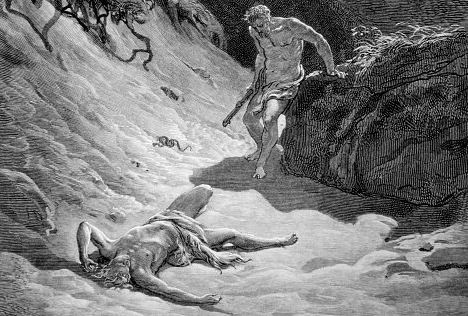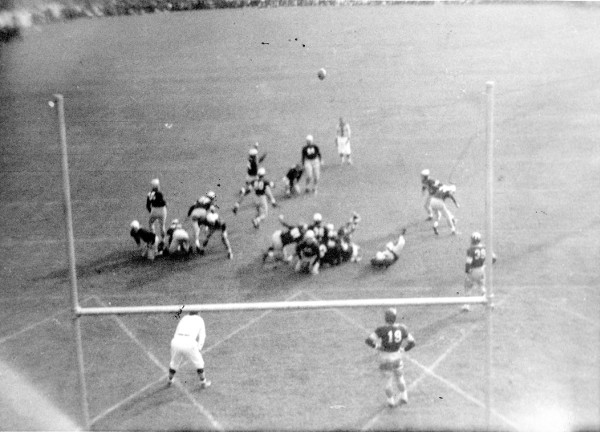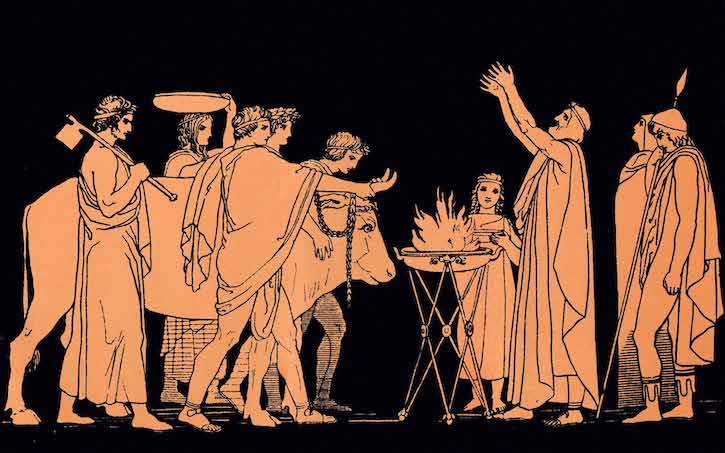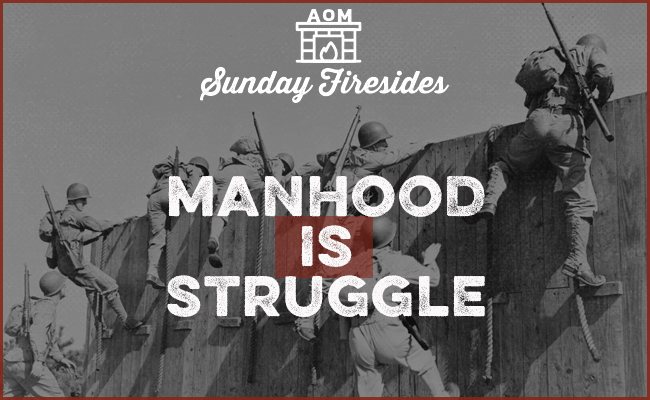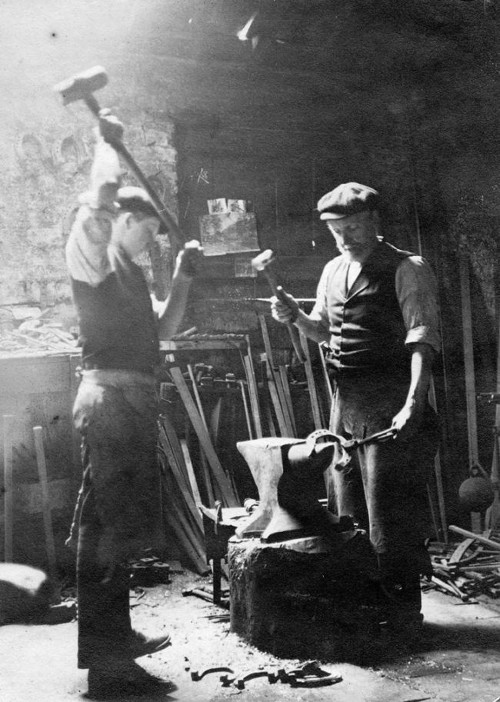
“Manhood…as a call to action, can be interpreted as a kind of moral injunction to provision kith and kin.”
If the imperative to protect is the most enduring and resonant with modern men, appealing to one’s heroic spirit, and the imperative to procreate is the most changed, challenged, and controversial, I personally feel that the charge to provide remains the most appealing to contemplate. There are a few reasons for that.
First, it’s the imperative that the greatest number of men participate in on any given day. For most modern men, the duty to protect is only called upon in rare crisis situations, and most of us are not courting or impregnating women on a daily basis (except for you, Genghis Khan). But just about every man has, at least at one time, had to earn a living, even if only to support himself. It’s something that’s part of our intrinsic day-to-day reality. We need food on the table, a roof over our head, and clothes on our back – and those things don’t come freely.
Second, it’s the imperative with the most flexibility, inclusivity, and creativity – it is, quite literally, the charge to create. The essence of provision is the ability to tame nature, to turn chaos into order, to take the raw materials of life and transform them into something of value. It involves, as author and anthropology professor David D. Gilmore puts it, “purposive construction” — “commanding and assertive action that adds something…to society’s store.”
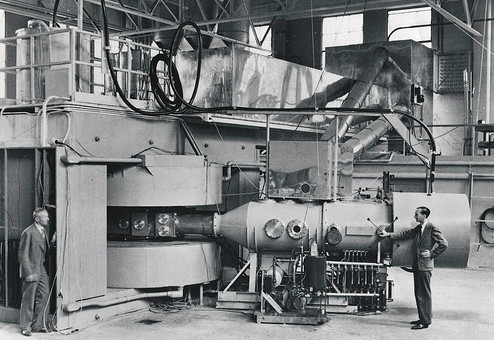
As a man’s creations can take an almost infinite variety of forms, the charge to provide is open to all. Someone like Stephen Hawking cannot be a physical protector, but he can use his intellect to add to the world’s treasury of knowledge. A Catholic priest cannot have children, but he truly acts as a “Father” to his flock, providing them with spiritual sustenance. Factory workers and philosophers, scientists and artists, ditch diggers and teachers — they all add something to society’s store — whether in tangible goods, knowledge, or beauty.
Related as it is to the ability to make something out of nothing, in many cultures resourcefulness was/is connected to the provider role as well and celebrated as a manly trait. As Gilmore points out, “the theme of solving collective problems figures in most mythologies of the world as the basis of the myth of the culture hero.” Think of the way Odysseus must use not only his strength, but his cleverness and wiles to get home to Ithaca, or how we laugh about a character like MacGyver but still kinda (okay, really) want to be him. Think too of the nerd whose smarts get his posse out of a pinch (paging Data from The Goonies!).
This quality of “heroic resourcefulness” in truth pricks my heart in the same way the protector role does, showing there’s room for gallantry in this imperative, too. In fact, provision and protection are interrelated – at least when the latter is viewed in a wider sense. The smarts, toughness, and ability to maneuver needed to be a good provider protects a man’s family, if not from armed enemies, then from debt collectors, hunger, and the specter of poverty knocking at one’s door.
Gilmore offers a statement that I think nicely summarizes all this: “I think we can characterize manhood, then, as a mythic confabulation that sanctifies male constructivity.” “Sanctifies” is truly the right word here, for it is in the act of creating that we become most like the gods. Which at last brings me to the final reason I feel that provision is the most appealing imperative to contemplate: man as worker, man as builder, man as creator – these roles offer the deep satisfaction that comes with being able to say: “I did this with my own hands.”
Even as I write this, my heart swells – the telltale effect of contemplating Truth. It tastes good to me.
But let us now step down from the lofty heights to trod the earth below. While in an ideal world, a man can fulfill the charge to provide by engaging in an endeavor that exactly aligns with his individual talents and proclivities, for much of modern history, being a provider was more about duty than self-actualization. So let us turn to exploring how this imperative was once viewed and lived, and why a role which now seems quite open to both sexes, came to be more strongly associated with men.
Note: All quotes, unless otherwise noted, come from David D. Gilmore’s Manhood in the Making.
Man as Provider
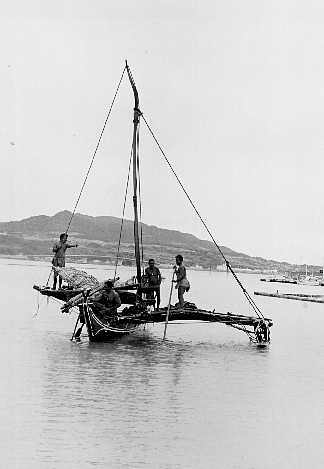
“In Greater Trukese Society…the identification of economic success with risk taking is based on the material constraints of island life, which require that men range far and wide to gain a livelihood, often by besting others in competitive contest…Before colonization, men fought and died to capture booty; they also had to go on risky deep sea fishing expeditions in order to feed their families…taking part in open ocean canoe trips was a frequent means of showing the competence that conferred manhood.”
In societies both past and present, if a husband desires to be considered a responsible man, “he must contribute the lion’s share of income to support wife and family like a pillar.”
The modifier “lion’s share” is important here. Despite our mythic ideal of the family, with wife staying home with the children, and husband going out each day to earn a living, this was really never the norm in any culture, at any time. Even in the 1950s in the United States, 1 out of 3 women worked outside the home. Interestingly, up until even the last decade, the ratio of male/female contribution to provision was about the same across cultures and time; when Manhood in the Making was published in 1991, it had been calculated that worldwide, “women contribute about 30-40% to subsistence in all kinds of societies, from the most primitive to modern civilizations.”
In premodern societies, that 30-40% contribution took the form of gathering, while men supplied the rest of the tribe’s sustenance through hunting. Women were also responsible for the lion’s share of the childrearing, although hunter/gatherer men were relatively involved fathers – more so than any dads up until the modern day:

Given the fairly egalitarian nature of our most ancient societies, two questions then naturally arise: 1) if both men and women acted as providers, why was there an especially heavy emphasis on provision as a manly role, and 2) why did men end up shouldering more of the responsibility for the duties of production, while women were given more responsibility over the tasks related to reproduction?
As to the first question, provision was more emphasized as a male imperative because men’s responsibilities were of a more acutely vital nature. As Gilmore puts it:
“Because male tasks so often involve contest and bloodletting rather than gentleness and patience, and because of their consequent win-or-lose nature, these tasks are often harshly evaluated as to performance. If women fail to collect vegetables, people may go hungry for a short period. But if men retreat in terror on the battlefield, or if they stop hunting, the tribe may well face destruction.”
We can trace the answer to question #2 to basic anatomical/biological differences between men and women. Men were the more obvious pick for hunting because of their greater physical strength and expendability (wombs being more valuable than sperm). Far from the bucolic hobbies of the modern day, hunting and fishing in primitive times could be strenuous and dangerous – even fatal. A hunter might have to hack his way through thick jungle and avoid attack by predators and enemy tribes, and an island fisher might have to paddle a canoe into the deep sea, weathering waves and storms. Hunting and fishing expeditions could also take men on expeditions far from home; it would have been difficult if not impossible for pregnant and nursing mothers as well as their small children to come along. Thus it made sense to our premodern ancestors for the women to stay close to home – tending to the kids and gathering food.
While it may be tempting to see plain old sexism as another factor at work in the labor split, as Wikipedia points out, it’s a mistake to view such a set-up through our modern paradigm:
“It is easy for Western-educated scholars to fall into the trap of viewing hunter-gatherer social and sexual arrangements in the light of Western values. One common arrangement is the sexual division of labor, with women doing most of the gathering, while men concentrate on big game hunting. It might be imagined that this arrangement oppresses women, keeping them in the domestic sphere. However, according to some observers, hunter-gatherer women would not understand this interpretation. Since childcare is collective, with every baby having multiple mothers and male carers, the domestic sphere is not atomized or privatized but an empowering place to be. In all hunter-gatherer societies, women appreciate the meat brought back to camp by men. An illustrative account is Megan Biesele’s study of the southern African Ju/’hoan, ‘Women Like Meat’. Recent archaeological research suggests that the sexual division of labor was the fundamental organizational innovation that gave Homo sapiens the edge over the Neanderthals, allowing our ancestors to migrate from Africa and spread across the globe.”
All of which is to say, that while many moderns would view the hunter/gatherer split as sexist, actual hunter/gatherers probably didn’t see it that way, and in fact, delegating the responsibilities of production and reproduction in this manner may have been precisely what allowed us to arrive at a civilization where such a division is no longer necessary! Perhaps we can say that what the split in responsibilities lacked in fairness, it made up for in harmonious efficiency.
Service to Community and Family
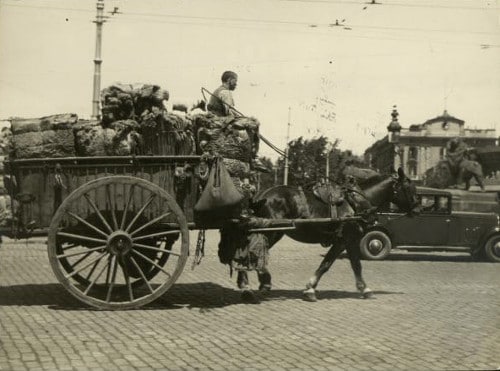
“In Southern Spain…men must seek to provision dependents by contributing mightily to the family patrimony. This, too, is measured by the efficiency quotient, by results. What counts, again, is performance in the work role, measured in sacrifice or service to family needs.”
As with all the 3 P’s, the imperative to provide was seen as a civic duty – a charge that benefited an individual man’s personal and psychological development, while also strengthening the community as a whole.
The economies of primitive societies functioned through the sharing of resources and mutual exchange, so that the men hunted together in gangs and distributed their bounty to the tribe as a whole. Bagging game during this period was driven more by a man’s desire to buttress his manly reputation than to feed his own biological kin – an able hunter strengthened the entire tribe, increasing his attractiveness to women, and his honor among men.
As societies modernized and an emphasis on individual earnings and ownership became more common, a man’s primary duty was to provide for his immediate family. But this charge remained civically connected; a family that was self-reliant did not become a burden on the rest of society. Also, as we shall see below, a man who did well for himself was expected to generously share his wealth with the rest of the community, so that a boon for one man was a boon for everyone.
From Dependence to Self-Reliance
The first step in a young man becoming an effective and respected provider was for him to attain “full and total independence.” Dependency in a man was seen as shameful, as it was an insurmountable hindrance to his ability to take care of others; a man could not provide for his own family if he was still reliant on his childhood family for support.
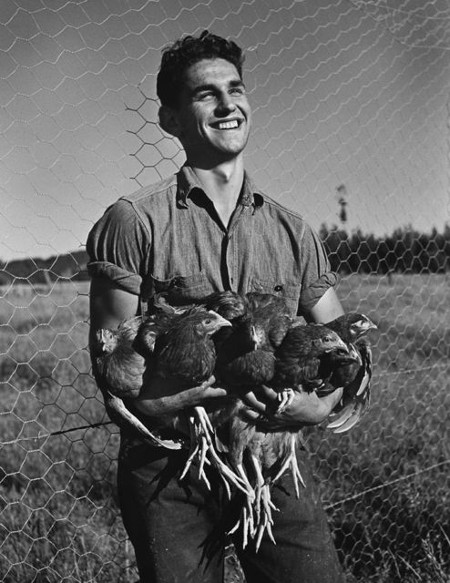
“In Morocco…as in Spain, a man must gain full and total independence from women as a necessary criterion of manhood. How can he provide for dependents and protect them when he himself is dependent like a child? This inversion of sex roles, because it turns wife into mother, subverts both the man and the family unit, sending both down to corruption and defeat.”
Becoming an independent man meant separating oneself from the nurturing caretaking of women, particularly one’s own mother — demonstrating you could stand on your own two feet.
Some cultures have rituals that vividly demarcate a boy’s departure from the world of women and entry into the world of men. For example, during some tribes’ rites of passage — in which a boy officially becomes a man — he is “kidnapped” from his mother’s home, and taken to live in the woods for a time with his fellow initiates. The boys are then taught the “secrets” of how to be men by the tribe’s elders before they are brought back to live in the community again — now recognized as full-fledged men.
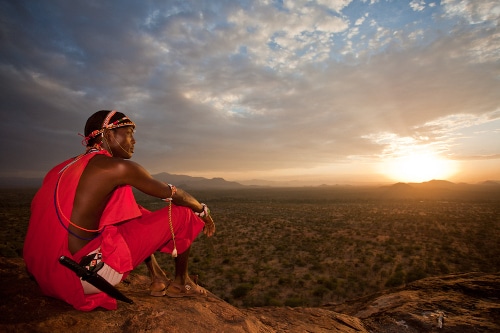
Among the East African Samburu, as part of a boy’s journey into manhood, he will ritually pass by his mother’s hut for the last time and swear an oath to never drink milk sourced from within the village again. Considered a delicious delicacy, giving up milk constitutes a true sacrifice and thus “demonstrates a resolve that amounts to a symbolic disavowal of dependency…It is an act of self-denial by which the boy enacts a personal transformation from receiver to giver of sustenance.” Gilmore argues that the act is designed to demonstrate that the boy “will no longer need mothering,” and that it reenacts “ritually and psychodynamically the trauma of weaning, for it conveys a public confirmation that he has renounced the breast voluntarily in favor of delayed gratifications of work culture.”
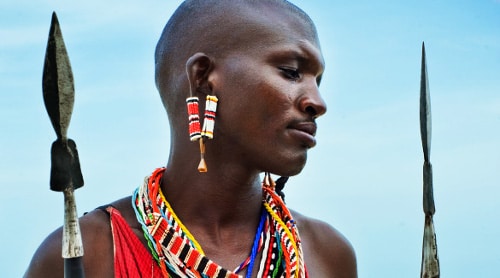
“Masai manhood is firmly based not only on the warrior ethic but also on the idea of economic independence…A high point of the boy’s moranhood [manhood] is the sacrifice of his first ox. The major portion of the meat is then given to the boys’ mother, an act that is described as a thank-you to her for having reared and fed him as a boy. This ritual feeding of his mother symbolizes the boy’s status reversal from consumer to provider of meat and thus indicates a responsible adult manhood.”
Hunting: The Provisioning Function Par Excellence

“It is not only in violent societies like the Sambia that hunting prowess is a measure of manhood. For example, there are the utterly nonviolent Mbuti pygmy of the Congo region…among these peaceable Pygmies, boys must learn the requisite masculine skills, especially the hunting of big game, such as elephants. Hunting supplies the tribe not only with needed nutrients but also with such indispensable materials of life as skin and bones, and with ritual paraphernalia. Any man who falls short in hunting has his manhood questioned and is put into the androgynous category of ‘clown.’”
For early man, there wasn’t really any choice as to what kind of “work” he could do to fulfill the provider imperative. In an age before specialization, hunting was pretty much it.
But what premodern man lacked in options, was made up for in a “job” that embodied all the traditionally manly attributes.
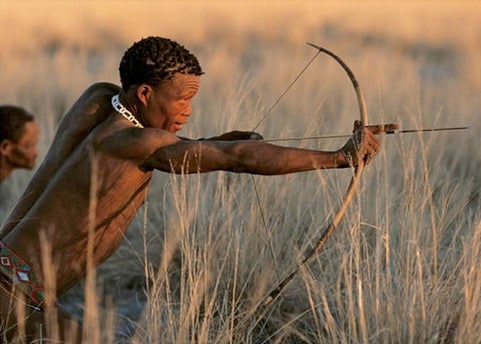
“Among the Bushmen…A boy cannot be considered a man, nor is he permitted to marry, until he has successfully made his first kill of an antelope. Elizabeth Marshall Thomas tells how boys in their late teens are initiated ‘into manhood, having shot their first buck.’”
The qualities requisite to a hunter’s success are those needed for success in any area of a man’s life, for it demands patience and discipline and “demonstrates a tenacity of purpose.”
Hunting is similar to warfare in that it is a dangerous and risky endeavor that is structured as a win/lose proposition. You either bag the game and come home with food for your tribe, or you return empty-handed – or possibly not at all. Success requires the mastery of weapons and the honing of technique.
It contains an element of sport, as it involves not only pitting one’s skill and determination against the beasts, but against one’s fellow men. As with any athletic team, a hunting gang is bound together by the intense camaraderie born of striving in a common, risky purpose. The men are both cooperative and competitive; the group works together, while at the same time each individual man wishes to demonstrate the greatest prowess – to be the “MVP” who plays an integral role in taking down the biggest game. A hunter’s performance either adds to or diminishes his honor, establishing his pecking order within the tribe.
Hunting is also a primally creative act for it is “the primary means of extracting value from nature by literally transforming wild animals into food.” The hunt provides one’s kith and kin not only with protein, but clothing to protect their bodies from the elements, and items vital to the tribe’s spirituality. In its feeding of both body and spirit, its nourishing and sustaining of life, it acts as a counterpart to female reproduction, and thus can be seen, Gilmore convincingly argues, as a form of indirect and often misunderstood male nurturing.
Finally, just as in the procreator role, man acts as the pursuer of a prize.
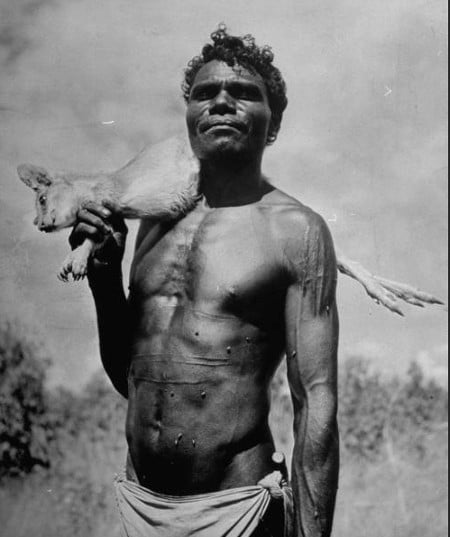
Thus hunting is a creative act that parallels battle, sport, and sex.
Given that “all the variables of manhood–economy, skill, hardiness, sexuality–come together most directly and dramatically both in symbols and in the fact of putting meat on the table,” hunting may truly be called the “provisioning function par excellence.”
The Vital Importance of Autonomy
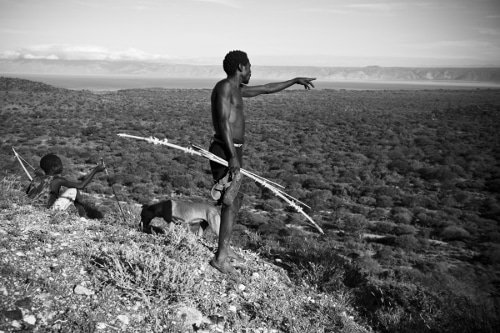
“’Real men are expected to tame nature in order to recreate and bolster the basic kinship units of their society…to create something of value from nothing. Manhood is a kind of male procreation; its heroic quality lies in its self-direction and discipline, its absolute self-reliance–in a word, its agential autonomy.”
There is one more important element that underlies not simply the manly nature of hunting, but upon which all the 3 P’s of Manhood depend: personal autonomy.
Autonomy involves the “absolute freedom of movement” — “a mobility of action.” It means being able to make your own decisions, call your own shots, create your own goals, set your own pace, carve your own path.
“Equally important as sex and economic resourcefulness is the underlying appeal to independent action as the starting point of manly self-identity.”
Manhood is an earned state – a title of honor achieved through effort, testing, and the overcoming of challenges. If barriers are erected that restrict a man’s ability to seek out better opportunities — that tie his hands and limit his ability to strive for excellence in his roles as protector, procreator, and provider – the chance for manhood and the very existence of manhood itself disappears.

Restrictions on a man’s autonomy may come from without – from external powers like governments and corporations.
If a man’s only choice for providing for his family is a job in a factory in which he is only a cog in the machine, and he cannot deviate from the set pace or his prescribed role as lever-puller, he is robbed of his autonomy, and thus his manhood.
If a government dictates how many children he can have, a man loses his autonomy as procreator. If it seizes all of his weapons, it also confiscates his chance of acting as a protector.
Limits on one’s personal autonomy can come from within as well, in burdening oneself with gross heaps of consumer goods and debt. As Gilmore writes, “To enter upon the road to manhood, a man must travel light and be free to improvise and to respond, unencumbered, to challenge. He must have a moral captaincy.” Hunter/gatherer tribes accumulated few material possessions, which allowed them to be flexible and nimble. They moved up to 20 times a year, following the herds of game, seeking out better opportunities. By burying himself under a mountain of stuff, the modern man’s options — his “mobility of action” — can be severely limited.
A Real Man is Generous

“I will describe another negative case from Andalusia…There was a man in Fuenmayor who was a notorious homebody and whose family suffered the consequence…Especially vilified was his stinginess with both time and money, which was felt as an insult to the other men of the pueblo, a calculated withdrawal from the male role, which demands not just familiar provisioning but a certain degree of generosity in the wider society. A man of means is expected to spend freely and thus to support his community.”
One of the findings of Gilmore’s cross-cultural analysis of masculinity that surprised me the most, was that generosity emerged as one of the ubiquitous elements of the worldwide code of manhood. I suppose the reason I was surprised is because I have been steeped in the American image of manliness as the rugged individualist – the self-made man who’s out to “get his” and seeks only his own interests. You know, “he who dies with the most toys wins,” and all that.
But the more common standard for men in cultures around the world is to become as successful as possible, and then to voluntarily share that wealth with the larger society. (America does certainly have a strain of this in our own history, which includes extraordinary philanthropists like Andrew Carnegie and Bill Gates). As mentioned earlier, the imperative to provide, like the other two P’s of Manhood, is framed not simply as an individual pursuit, but a civic duty. Thus a man who did well for himself was charged with giving back and strengthening his community.
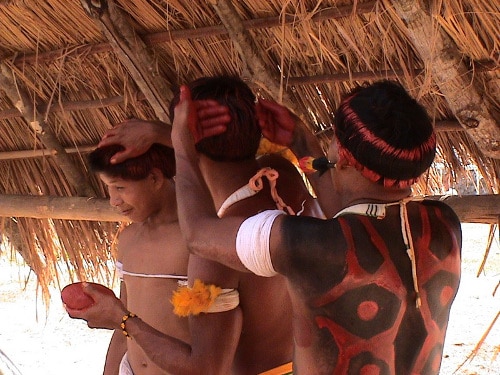
“The hallmark of a real man is that he is selfless; he eats with his kinsmen and friends assembled around him and always shares his food. On the other hand, the man who is stingy with food eats alone…The worst kind of man in Mehinaku though is one who is lazy stingy, greedy, evasive, and who eats more than his share. Such parasitic men are despised as effeminate and ostracized as freeloaders; the people assume they are mendacious, immature, and futile as well….a real man is a giving soul, ambitious but generous, a committed team player who pulls his own weight.”
As with all aspects of the code of manhood, excellence in the provider role, including one’s acts of generosity, had to be publicly demonstrated. While in Christianized nations the standard of “Take heed that ye do not your alms before men, to be seen of them” has made showy acts of giving seem gauche if not shameful, in many societies making your offerings before men was the whole point. For it was not a completely altruistic exercise but rather a way to increase your personal honor, which as we know, is a reputation worthy of respect and admiration that is publicly affirmed.
The more people a man provided for, the more dependents he created, and the more dependents he created, the more manly – kingly, really – he was perceived. Thus generosity was a kind of competition to see who could provide the most and consume the least. This is demonstrated in an example from the Samburu tribe:
“At every feast, each man tries to give the most and take the least. At most feasts, for instance, younger men would insist on giving their seniors the best pieces of meat…Even among age mates, whose equality was beyond question, there was a continual battle of politeness in which the man who seemed to eat the least and encourage his neighbors to eat the most was the moral victor, the truly worthy man. A selfish man, an ‘eater’ of his own herds, is described as a laroi–a term used among the Samburu for small, paltry things, undersized or fragile objects, and for tools, that do not work effectively, like a leaky water bucket or a Land Rover that keeps breaking down. The laroi man then, is childlike (undersized), mean, deficient, wasteful, inefficient. He takes more than he gives…The goal is to become a tribal patron, creating dependencies in others, involving oneself in battles of generosity with other men in which everyone indirectly benefits. In this equation, subordination to another man is considered by the Samburu ‘an ineradicable stain upon personal honor.’”

“Among the Muslim villagers…of central India, male honor is achieved by a number of different kinds of forceful actions. Such actions include matchless piety, the accrual of material wealth, success in various kinds of male competitions, winning out over one’s rivals, the retention of followers and dependents, and especially the generous distribution of gifts…among all castes and sects in north and central India…lavish gift-giving is an important means of promoting izzat [honor] throughout the region, especially when gifts are made without apparent thought of return and when they enrich the group and extend its power.”
Providing in the Present
With how often the increasing numbers of women in the workplace is discussed in the media and popular culture, one might imagine that, like procreation, this P of Manhood would be greatly challenged in the modern day. But in many ways, what is striking about the current state of this traditionally male imperative is how much it has endured despite a rapidly shifting cultural landscape. And perhaps what was most surprising to me in researching this post, is that opposed to moving away from the past, the provision plane has in some respects actually come full circle — back to our earliest hunter/gatherer ancestors.
A Golden Age for Provision?
Oftentimes when a man’s duty to provide for his family is discussed, those with sympathies towards the men’s rights movement will respond by saying that this imperative essentially turns men into workhorses – bridled and put-upon brutes who must put aside their own desires to do society’s thankless dirty work.
It’s true that at its foundation the provider role was/is a duty – work that a man has to perform even if it is difficult or personally unsatisfying. It is first and foremost about filling the bellies of one’s kin, rather than self-actualization. Gilmore writes of one culture’s begrudging view of this obligation:
“The worker in the fields often despises manual labor of any sort, because it rarely benefits him personally. For example, the rural Andalusians say that work is a ‘curse’ because it can never make a man rich. For the poor man, working means contracting under humiliating conditions for a day-wage, battling his fellows for fleeting opportunities in the work place, and laboring in the fields picking cotton and seeding sunflowers from dawn to dusk. Synonymous with suffering, work is something that most men will freely admit they hate and would avoid if they could…A man works hard, sometimes desperately, because, as they say, ‘se oblige,’ you are bound to your family, not because you like it…Work, then, is not regarded as having any intrinsic rewards.”
One can certainly find such sentiments amongst cultures around the world. But what is interesting to me, is that they come from modern, post-industrial peoples (the quote above is based on studies done on the Andalusians in the 70s and 80s). Among hunter/gatherer tribes, both those of the past, and those that remain, one does not find the sentiment “Work sucks.” “Hunting blows.”
It is impossible to say how much primitive hunters “enjoyed” their work in our modern sense of that descriptor. But given what modern psychologists have said are the three keys to motivation in any endeavor – autonomy, mastery, and purpose — and given the fact that, as just discussed, hunting included these traits in spades, it’s not hard to imagine that tribesmen did/do find hunting deeply satisfying, despite its great difficulties and dangers.
Agriculture and industrialization disrupted this most basic pattern of work. In settled civilizations a few men accumulated great wealth, while the peasantry endured the dehumanizing constraints of serfdom. And then the Industrial Revolution further turned men into machines.

As in primitive times, for many men there were few options for making a living (labor in a factory, labor in a mine), but unlike the tasks of early hunters, any autonomy in these provider pathways had been stripped clean. America’s yeoman farmers held on to their self-determination, but for those forced to migrate to urban areas and take a job in a factory or coal mine, their pace was set by a conveyer belt, their role involved no creativity or mastery of skill, and at the end of a 12-hour shift, gazing upon a pile of widgets they helped produce granted no sense of purpose or satisfaction. And all this for a wage on which they could barely subsist. The “moral captaincy” of such wage workers withered under the boss’ thumb. Their “mobility of action” was crushed under the heel of corporate rule.
Options for work expanded as the 20th century wore on, but even through its latter half (and even today, for many), there was an expectation that a responsible man would don a gray flannel suit and happily toil away in a cubicle until he earned his gold watch and could retire.

Such work stripped away the psychological benefits that should be part and parcel of the provider role, leaving only the bare bedrock of duty. Lacking in autonomy, and the other traditionally manly attributes, such work did indeed turn men into beasts. But it is not the code of manhood that did this, but economics; the manly imperative to provide remained unchanged, it was the nature of work that changed around it. Whenever there are not enough jobs for those who want them, and/or the bulk of the jobs available amount to the crushing of mind and/or body for paltry pay, men rightly speak of feeling as though they are robbed of their manhood. Given that the prerequisites to earning manhood – including the chance to strive for excellence and honor – are absent, they are exactly right.
Yet this is why I would argue that we currently live in a golden age of provision. That might seem like a strange contention at first blush. It’s true that well-paying manufacturing jobs, long thought of as a traditionally manly part of the economic sector, have disappeared in droves. But in studying history, I get the sense that the supposed manliness of manufacturing was added ex post facto; that is, it wasn’t that men were particularly drawn to working in a factory, but that that’s all there was, and since that’s all there was, lots of men did it because they had to, turning it into a “manly” line of work. Of course, during the decades where manufacturing jobs paid a very decent wage, such work was understandably considered manly because it enabled you to provide a good life for your family.
While the manufacturing sector has been crumbling, mindless white collar jobs along with low-paying customer service jobs have proliferated. And overall the economy is still limping along, while the gap between the haves and have nots yawns ever wider.
So how can I say we live in a golden age of provision?
Well, I’m not at all naive about the challenges men face in earning a living in our modern world. But judged solely on the basis of the number of opportunities to provide in a truly manly way – in work rich with autonomy, purpose, and mastery – the modern age is without rival. Becoming an entrepreneur has never been so within reach. Geographic mobility is at an all-time high, as travel has never been cheaper or easier. The internet has made it easier to start any kind of business, and gain an audience for your creative work, than ever before in human history. Anyone, from any background, can create a start-up and become their own boss. Specialization ensures that you can find a job and a niche that most aligns with your individual talents and desires. One can be a scientist, professor, musician, firefighter, carpenter, tattoo artist, chef, programmer, even that most questionably manly of jobs – professional blogger. The options for how to make a living, and do it in a satisfying way, are nearly limitless. A modern man who is disciplined and a self-starter has more freedom than ever before to “hunt” down his goals and bag himself a uniquely satisfying career.
It’s not to say that many of us, most of us really, won’t at some time find ourselves in a job we dislike, and that we only do to support ourselves and/or our family. Doing what you must to provide for those you love remains the standard of manhood. But it has never been so possible to pivot from such jobs, so that they only have to serve as weigh stations on the journey to greater autonomy and a manly vocation.
Ironically though, the upside of this golden age can also be a downside, in adding undue pressure to this pillar of manhood.
Provision as an Overburdened Pillar
Last time, we talked about the fact that manhood is supposed to be supported by a triad of pillars, and that things go awry when one of the pillars is loaded with more weight than it is designed to hold. We talked about the way that procreation often ends up as the overburdened pillar – that in a time where men might have unsatisfying white collar jobs, and don’t serve as protectors, sex remains the low hanging fruit that gets seized on and obsessed over to buoy one’s manly identity.
But the provision pillar can also come under an undue amount of stress.
Men are meant to be citizen-soldiers. Drop the soldier part and you get a bunch of unused masculine energy that gets shunted into the provision role – creating a load it wasn’t meant to bear.
A perfect example of this is the development of the Japanese “salaryman.” During the relatively peaceful Tokugawa period (1600 to the mid-19th century), the ideals of Japan’s samurai warrior class transformed into a more general ethic that could be lived by all citizens. Modernly known as Bushido, this code of honorable, chivalric behavior retained its martial flavor and continued to emphasize warrior values – like choosing death over dishonor. At the same time, principles of unyielding loyalty, devotion to family and authority, and selfless, meritorious service in collective goals were given a wider, peacetime application. This martial and moral code became part of the national spirit.

But after Japan’s defeat in World War II, and the country was demilitarized, the Bushido code’s martial energy was dropped from the country’s ethic, and channeled entirely into building up the nation as a corporate, capitalist powerhouse. Obedience to one’s masters became subservience to the company hierarchy. Selfless devotion to collective goals remained, but the goal now became the bottom line. Swords were beaten into plowshares, and the pushers of those plowshares were beaten with stress and 80-hour workweeks. “Honor unto death” became “death from overwork” – quite literally. In the absence of the pillar of protection, the pillar of provision became overtaxed and distorted.
There may be a domino effect when it comes to the 3 pillars of manhood – so that when one becomes contorted from bearing too much weight, the other pillars begin to twist and contort as well. It has been theorized that the overwork and drudgery a modern Japanese man endures at least partially explains the country’s very weird sex culture (vending machines that dispense used panties, video games where you stalk and rape women, pillow girlfriends, etc.).
It’s not just the pressure to become a corporate drone that has overloaded the provider pillar, however. As mentioned above, the seemingly infinite number of interesting jobs today makes it easier than ever to find a satisfying, purpose-filled career. On the flipside, however, this has made choosing the right one an anxiety-filled endeavor. In a time where people are delaying starting families (there goes the procreation pillar), and only .5% serve in the military (there goes the protection pillar), your career has become the end-all, be-all of your manhood and identity. Thus young men are filled with doubt as to which vocation to pursue. What am I “meant” to do? Does this or that career best make use of my talents and personality? Do other people have cooler jobs? Will I miss out on something great if I choose this path? (Good news, your options aren’t limitless!)
In the traditional rubric of manhood, provision was only supposed to be a single pillar in a triad of pursuits. Today, many men are their f**cking khakis. Even if those khakis are jeans, and reside in Silicon Valley.
Bringing Home [Part] of the Bacon
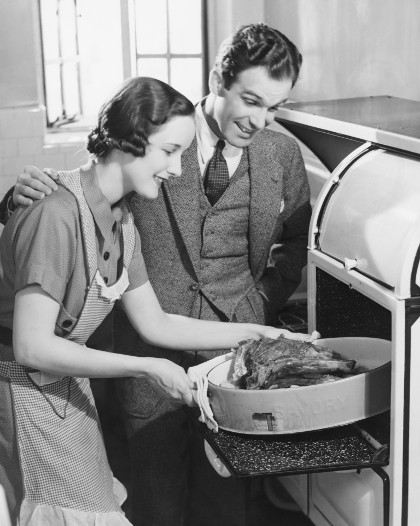
The number of working women has been steadily increasing in the last several decades. Women now make up 47% of the workforce, and according to Pew Research “the employment rate of married mothers with children has increased from 37% in 1968 to 65% in 2011.”
Yet as discussed above, anyone who studies history will know that the mother-as-homemaker/father-as-breadwinner set-up was never the norm. The narrative that the increasing number of women in the workforce is part of a linear societal decline just doesn’t add up. It’s a departure from the past, only if your history only goes back several decades. But if you look at the long sweep of things, you realize that 100% of women in hunter/gatherer societies “worked,” so 47% really represents a steep decline! Further, despite all the talk of radical change in our culture, the percentage of the total income earned by women is still about 30%…the same as when Manhood in the Making was published, and the very same ratio of our most primitive societies!
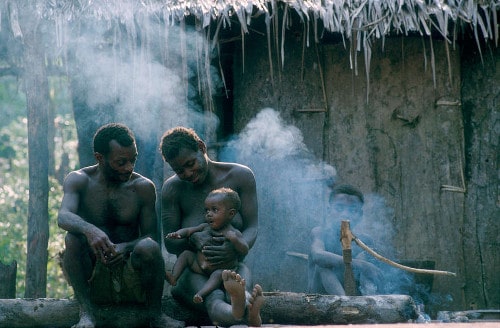
I guess the more things change, the more they stay the same, and that goes for attitudes just as much as behavior. While there has been a steady trend toward greater acceptance of working women, the public remains very conflicted about the roles of mothers and fathers in the production/reproduction scheme. For example, while 79% of Americans don’t think men and women should return to traditional roles, 74% feel that the increasing number of dual-earner households has made it harder to raise kids, and 50% say it’s made marriages harder to succeed.
Further, while 63% reject the notion that families are better off if the husband earns more than the wife, a heavier emphasis on men as providers remains. 76% say children are just as well off if their father works, while only 34% say the same about the children of working mothers. 51% of Americans say children are better off if their mother is home and doesn’t hold a job, while only 8% say the same thing about stay-at-home fathers. And just 16% say having a mother who works full-time is the ideal situation for a young child.
In the absence of the factors that brought about a 70/30 male/female production split in primitive times – the dangerous physicality of hunting and the need for men to journey far afield – and in a time where most jobs can be done just as well by men as by women, why has an emphasis on man-as-provider, woman-as-mother proved so persistent? And why are shifts towards greater female participation in the provider role always accompanied by an almost palatable anxiety?
I think there remains a greater emphasis on the need for male provision because of a deeply ingrained fear of men coming back empty-handed from the hunt. I think all humans are embedded with a primal belief that the contributions of men to society’s sustenance are more acutely vital — that without them, the tribe will starve and face destruction.

It is not an irrational or even a sexist fear. With all the talk of the strides women have made in many areas of professional and public life, at the current moment, 80% of Congressional representatives, 95% of Fortune 500 CEOs, 97% of firefighters, 85% of members of the military, 95% of airline pilots, 70% of physicians, 80% of software engineers, 85% of police officers, 86% of engineers, 97% of construction workers, 98% of miners, 98% of mechanics, and 99.9% of stone and brickmasons are still men. Were men to vanish right now, our tribe would face imminent destruction. (There’s actually a comic book, Y the Last Man, that explores what would happen if every man in the world were to suddenly die off.) Men also hold 94% of patents – demonstrating that males are not only essential to our survival, but also continue to drive societal progress and technological advancements.
Even if we could somehow create a completely gender-neutral culture moving forward, where women and men were equally encouraged to pursue every career, there remains the question of whether there would ever be enough women willing and motivated to fill all the needed jobs. Will there ever be enough women who want to be loggers and oilrig workers, mechanics and soldiers?
While we rarely acknowledge, much less celebrate, men’s contributions in keeping the world turning, I think all humans understand at a gut-level how reliant we are on willing male providers. Even if we know that men will not suddenly vanish, news that implies that male production levels are falling still induces a primal worry about our future.
Thus in 2014, both women and men provide, and make invaluable contributions to a family’s living and society’s. But at the same time, a heavier emphasis in our culture continues to be placed on men’s provisions as acutely necessary for our survival and advancement. Which is pretty much the same as it was thousands of years ago. Makes me wonder if all this recent interest in the Paleo lifestyle goes a lot deeper than diet.
Conclusion
As I’ve stated before, these posts are meant to be more descriptive than prescriptive, so I should probably point out that given the nature of the modern landscape, I personally don’t have a problem with individual couples tinkering with the provision/reproduction division of responsibilities. For example, I honestly have zero problem with a man deciding to be a stay-at-home dad. Sometimes women have more to contribute to the outside world, and sometimes men have more to contribute within the home. I know a family where the wife works full-time as an engineer, and the husband stays home with his two boys. They’re both way more suited to these roles than if the roles were reversed. They’re happy and more power to them.
I have to imagine that many people figure me for a very strict gender role essentialist in my own life, but in actuality, Kate and I have a marriage that is likely more egalitarian than 98% of others. We run a business together and split household chores and childrearing tasks just about 50/50. We both watch the kids in the morning and then have Kate’s mom watch the kids in the afternoons so we can get work done (we also work at night after the kiddos go to sleep).
We’re incredibly happy in our marriage and very satisfied with our life, but that doesn’t mean we don’t also question the strengths and weaknesses of our arrangement.
The upside of our set-up is that each of us gets to enjoy both parental and professional fulfillment. The downside is that not having clearly defined roles can make life more chaotic. It’s a trade off. We get to do both roles – but we’re not necessarily as good entrepreneurs, nor as good parents than if each of us concentrated on one role each. So the question we’re both willing to entertain is, is trading harmonious efficiency for personal fulfillment a good trade? It may be good for us personally, but is it the best thing for the kids? Is it better for them to have a moderate amount of time with both parents, or would it be better for them to have a lot of time with one parent, and a little with the other? What’s better for society as a whole? For us to shut down the blog and for Kate to become a full-time mom, and me to become a barber? Or will doing things the way we do them now allow us to both raise good kids and maybe add something valuable to society’s store at the same time? These are questions we critically aim at ourselves all the time, and questions I think families all over the country grapple with. Everyone wonders, “Are we doing this right?”
I think some people feel I believe myself to be an oracle of manliness, but I honestly do not have answers to all the questions. I’m most interested in exploring the questions.
I will posit that everyone, men and women alike, are happiest when they are involved in both reproduction and production, regardless of the ratio of their responsibilities in each realm. The moms I know who are happiest are those who have a part-time job or have a little sideline business they do from home. And the dads I know who are happiest work reasonable hours and are able to make it home for family dinners and to their kids’ activities. And vice versa with working moms and stay-at-dads. Everyone needs an outlet in their life, even if it’s just a hobby, where they get to act as providers — creators.
Gilmore observes that around the world, and through the ages, the critical threshold for manhood “represents the point at which the boy produces more than he consumes.” I have yet to encounter a better marker for maturity – for either sex.
Read the rest of the series:
Part I – Protect
Part II – Procreate
Part IV – The 3 P’s of Manhood in Review
Part V – What is the Core of Masculinity
Part VI – Where Does Manhood Come From?
Part VII – Why Are We So Conflicted About Manhood?
Part VIII – The Dead End Roads to Manhood
Part IX – Semper Virilis: A Roadmap to Manhood
________________________
So now we’ve covered the 3 P’s (and how!). Next we’ll do a much shorter review of the 3 P’s, so those who didn’t make it through these beastly posts can get up to speed, and we’ll see if we can’t distill down the code of manhood even further. Then, we’ll hit a very important element that underlies all this and has yet been missing from the discussion – where does manhood come from and why has it gone missing in the modern day? Finally, we’ll talk about the reasons you should consider living the code of manhood, even if it’s not currently needed or celebrated.
Source:
Manhood in the Making: Cultural Concepts of Masculinity by David D. Gilmore


